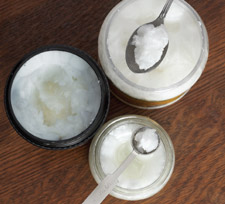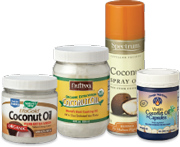Do the health benefits of coconut oil make it worthy to take as a supplement?
by Nick Rose, M.S., PCC Nutrition Educator
This article was originally published in March 2012

I do think coconut oil is a healthy addition to your diet, but I would rather see people cook with this healthy fat rather than take it as a supplement. Many shoppers are surprised to hear my recommendation, given coconut oil’s high saturated fat content, but here are three characteristics that make coconut oil great for cooking.
First, saturated fats are the most stable fats, meaning they are less likely to become oxidized during cooking or storage. Liquid cooking oils are more susceptible to oxidation during high-temperature cooking, and the resulting oxidized fatty acids promote atherosclerosis and are unhealthy to consume.
Second, while it is true that most saturated fats raise blood cholesterol, high blood cholesterol levels don’t always mean greater heart disease risk, contrary to the traditional low-fat message we have all heard over the past 40 years from the nutrition community (inflammation is a stronger risk factor).
Third, the saturated fats found in coconut oil are medium-chain fatty acids, which are metabolized in the body in a different way than the (longer-chain) saturated fats in butter, lard and other animal foods. The saturated fat in coconuts is primarily lauric acid — this fatty acid raises “good” cholesterol levels (HDL), has antibacterial properties, and seems to benefit dry hair and skin.
We actually do carry coconut oil capsules (soft gels), but it is important to consider that taking coconut oil as a supplement may unnecessarily increase your total fat intake. Cooking with coconut oil makes more sense to me — unless you don’t like the flavor of coconuts, that is! It’s not the best for scrambled eggs, but I find coconut oil a welcome addition to stir-fries, soups, curries, cookies and popcorn.

Grocery aisles
Coconut oil is aromatic and buttery, rich in antioxidants and immune-boosting lauric acid. It also is more heat stable than most plant-based oils and can withstand high temperatures without breaking down into trans-fatty acids, making it an ideal cooking fat for stir-fries, sautés and baking.
- Organic coconut oil from Spectrum Organics, Artisana Organic Foods, Nutiva, and Omega Nutrition
- Organic, fair trade coconut oil from Dr. Bronner’s
- Organic coconut oil cooking spray from Spectrum
Health and Body Care department
You’ll find high-quality coconut oil for those who wish to take it as a dietary supplement. Coconut oil also makes a soothing, moisturizing lotion for dry or damaged skin.
- Organic coconut oil from Barlean’s Organic Oils and Nature’s Way
- Coconut oil capsules from Omega Nutrition
